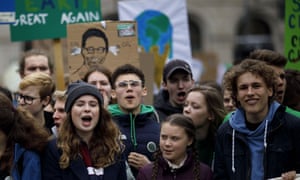Extract from The Guardian
Next generation must keep their own carbon levels at a fraction of their grandparents’ in order to prevent catastrophe
Children
born today will have to live their lives with drastically smaller
carbon footprints than their grandparents if climate change is to be
controlled.
Fast, deep cuts in global emissions from energy, transport and food are needed to keep temperature rises in check and an analysis has shown this means the new generation will have lifetime carbon budgets almost 90% lower than someone born in 1950.
The data dramatically highlighted the burden inherited by today’s children, an issue at the heart of the global school strikes for climate. Another major strike will take place in more than 70 nations on Friday.
“Those in positions of power – from politicians to business leaders –
that have benefited from a much higher lifetime carbon budget have a
duty to act to ensure a liveable planet for current and future
generations,” said Jake Woodier at the UK Student Climate Network, which is supporting the strikes. “Without appropriate action, those in power are sacrificing our tomorrow for their today.”Fast, deep cuts in global emissions from energy, transport and food are needed to keep temperature rises in check and an analysis has shown this means the new generation will have lifetime carbon budgets almost 90% lower than someone born in 1950.
The data dramatically highlighted the burden inherited by today’s children, an issue at the heart of the global school strikes for climate. Another major strike will take place in more than 70 nations on Friday.
The new analysis by the thinktank Carbon Brief combines data on emissions and population changes with climate models. It then calculates how much the average citizen on Earth can emit over their lifetime to keep temperature rises below 1.5C or 2C above pre-industrial levels, the goal of the world’s nations to avoid climate catastrophe.
Previous and existing generations have emitted nearly all the carbon dioxide needed to take the world to 1.5C or 2C, meaning future generations will have to severely cut the emissions from flying, meat consumption and other activities in their lifetimes. The children and young people taking part in the youth strikes (born 1997-2012) will have carbon budgets just one sixth those of their baby boomer grandparents (1946-1964).
“As protests by school children increase each week around the world, our analysis starkly highlights the intergenerational injustice of climate change,” said Leo Hickman, editor of Carbon Brief. “If warming is to be limited to safe levels, today’s children are going to have to greatly curtail their own lifetime emissions compared to older generations.”
The idea for the analysis came from Ben Caldecott, at the University of Oxford’s Sustainable Finance Programme. He said it is the first systematic use of emissions data to inform the debate about intergenerational responsibility for climate change and had produced some “uncomfortable numbers”.
But in a second analysis, Carbon Brief posited a future carbon budget that would be the same for every citizen on the planet. This would mean that the budget for a child born today in the US is even lower, 97% lower than that of that of their grandparents. For someone born today in Europe, their budget would be 94% lower.
“That those born today only have a carbon budget a fraction of the size of those from previous generations exemplifies the need for a transformative approach that puts social and economic justice at the heart of plans to tackle the climate crisis,” said Woodier. “We need massive investment in people and planet to transform our economies, and we need it urgently.”

No comments:
Post a Comment